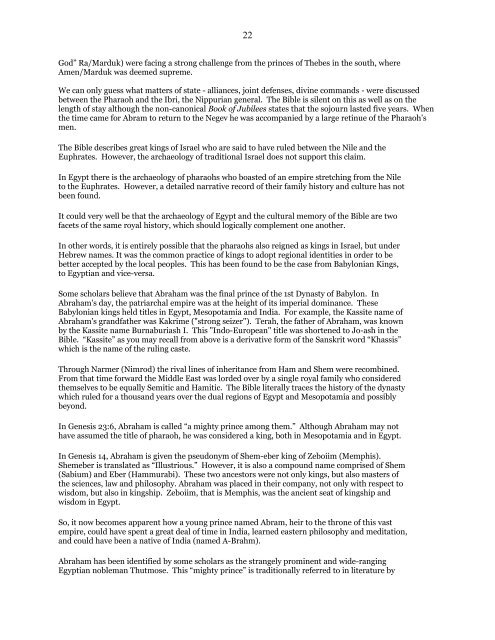Create successful ePaper yourself
Turn your PDF publications into a flip-book with our unique Google optimized e-Paper software.
God” Ra/Marduk) were facing a strong challenge from the princes <strong>of</strong> Thebes in the south, where<br />
Amen/Marduk was deemed supreme.<br />
We can only guess what matters <strong>of</strong> state - alliances, joint defenses, divine commands - were discussed<br />
between the Pharaoh and the Ibri, the Nippurian general. The Bible is silent on this as well as on the<br />
length <strong>of</strong> stay although the non-canonical Book <strong>of</strong> Jubilees states that the sojourn lasted five years. When<br />
the time came for Abram to return to the Negev he was accompanied by a large retinue <strong>of</strong> the Pharaoh’s<br />
men.<br />
The Bible describes great kings <strong>of</strong> Israel who are said to have ruled between the Nile and the<br />
Euphrates. However, the archaeology <strong>of</strong> traditional Israel does not support this claim.<br />
In Egypt there is the archaeology <strong>of</strong> pharaohs who boasted <strong>of</strong> an empire stretching from the Nile<br />
to the Euphrates. However, a detailed narrative record <strong>of</strong> their family history and culture has not<br />
been found.<br />
It could very well be that the archaeology <strong>of</strong> Egypt and the cultural memory <strong>of</strong> the Bible are two<br />
facets <strong>of</strong> the same royal history, which should logically complement one another.<br />
In other words, it is entirely possible that the pharaohs also reigned as kings in Israel, but under<br />
Hebrew names. It was the common practice <strong>of</strong> kings to adopt regional identities in order to be<br />
better accepted by the local peoples. This has been found to be the case from Babylonian Kings,<br />
to Egyptian and vice-versa.<br />
Some scholars believe that Abraham was the final prince <strong>of</strong> the 1st Dynasty <strong>of</strong> Babylon. In<br />
Abraham's day, the patriarchal empire was at the height <strong>of</strong> its imperial dominance. These<br />
Babylonian kings held titles in Egypt, Mesopotamia and India. For example, the Kassite name <strong>of</strong><br />
Abraham's grandfather was Kakrime ("strong seizer"). Terah, the father <strong>of</strong> Abraham, was known<br />
by the Kassite name Burnaburiash I. This "Indo-European" title was shortened to Jo-ash in the<br />
Bible. “Kassite” as you may recall from above is a derivative form <strong>of</strong> the Sanskrit word “Khassis”<br />
which is the name <strong>of</strong> the ruling caste.<br />
Through Narmer (Nimrod) the rival lines <strong>of</strong> inheritance from Ham and Shem were recombined.<br />
From that time forward the Middle East was lorded over by a single royal family who considered<br />
themselves to be equally Semitic and Hamitic. The Bible literally traces the history <strong>of</strong> the dynasty<br />
which ruled for a thousand years over the dual regions <strong>of</strong> Egypt and Mesopotamia and possibly<br />
beyond.<br />
In Genesis 23:6, Abraham is called “a mighty prince among them.” Although Abraham may not<br />
have assumed the title <strong>of</strong> pharaoh, he was considered a king, both in Mesopotamia and in Egypt.<br />
In Genesis 14, Abraham is given the pseudonym <strong>of</strong> Shem-eber king <strong>of</strong> Zeboiim (Memphis).<br />
Shemeber is translated as “Illustrious.” However, it is also a compound name comprised <strong>of</strong> Shem<br />
(Sabium) and Eber (Hammurabi). These two ancestors were not only kings, but also masters <strong>of</strong><br />
the sciences, law and philosophy. Abraham was placed in their company, not only with respect to<br />
wisdom, but also in kingship. Zeboiim, that is Memphis, was the ancient seat <strong>of</strong> kingship and<br />
wisdom in Egypt.<br />
So, it now becomes apparent how a young prince named Abram, heir to the throne <strong>of</strong> this vast<br />
empire, could have spent a great deal <strong>of</strong> time in India, learned eastern philosophy and meditation,<br />
and could have been a native <strong>of</strong> India (named A-Brahm).<br />
Abraham has been identified by some scholars as the strangely prominent and wide-ranging<br />
Egyptian nobleman Thutmose. This “mighty prince” is traditionally referred to in literature by<br />
22


